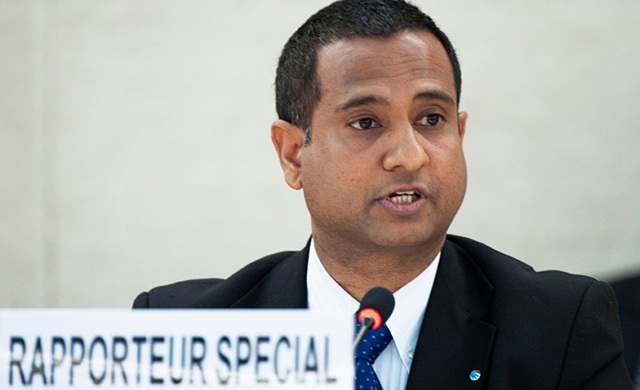
Dr. Ahmed Shaheed, the UN Special Rapporteur
March 27, 2015—The United Nations Human Rights Council voted today to renew the mandate of Dr. Ahmed Shaheed, the UN Special Rapporteur on the situation of human rights in Iran, signaling the international community’s continued concern over the state of human rights in Iran. The resolution to renew the mandate received 20 votes in favor, 11 against, and 16 abstentions.
“The vote’s message is loud and clear: four years after the establishment of the mandate, Dr. Shaheed’s work is not done,” said Hadi Ghaemi, executive director of the International Campaign for Human Rights in Iran. “The most basic rights and freedoms continue to be routinely violated in Iran.”
The Campaign welcomed two new developments in the vote call: El Salvador, a new member to the Human Rights Council, voted in favor of the resolution, and Gabon, who had voted against it last year, shifted its vote to a yes. Japan voted for the resolution, even though it has a bilateral human rights dialogue with Iran, noting, “progress is not easily observed at present.”
The Campaign noted with dismay that Brazil, a longtime supporter of the mandate, changed its vote to an abstention, despite Iran’s continued refusal to allow the Special Rapporteur to enter the country and Iran’s lack of implementation of the vast majority of the recommendations from the UN’s Universal Periodic Review.
The vote to renew the mandate followed Dr. Shaheed’s presentation of his report on human rights in Iran to the UN Human Rights Council on March 16, 2015.
Read the report here (PDF)
In the report, Dr. Shaheed expressed grave concern that the number of executions in Iran in 2014 had reached its highest level in 12 years, and noted deteriorations in women’s rights, minority rights, online freedoms, and the ongoing imprisonment of hundreds of prisoners of conscience.
In a report similarly critical of Iran’s human rights record released on March 3, 2015, UN Secretary General Ban Ki-moon also detailed his concerns over the ongoing application of the death penalty, retaliation against activists cooperating with the UN, and worrisome developments in the treatment of women.
“Iran can begin improving its rights situation by allowing Dr. Shaheed into the country to conduct his work, a permission that has been denied throughout the four years of the mandate,” said Gissou Nia, deputy director of the Campaign.
Follow the Campaign on Facebook and Twitter
For the latest human rights developments in Iran visit the Campaign’s website
For interviews, contact:
Hadi Ghaemi at +1-917-669-5996, hadighaemi@iranhumanrights.org
Gissou Nia at +1-203-654-9342, gissou.nia@iranhumanrights.org
